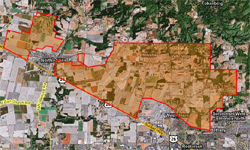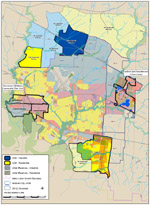|
||||||||
The Metro and Tri-County Urban and Rural Reserves Process
(Note: Much of this information is taken from the Metro Reserves web site. More detailed information may be found there, and many of the links on this page refer to pages at that site.)
What are urban and rural reserves? What are urban and rural reserves?From 2008 through 2012, Clackamas, Multnomah and Washington counties and Metro led a regional process to identify land for future urban development and protect farms, forests and natural areas for the next half century. During that time, Metro and the three counties entered into agreements that would determine the location and scale of urban development for the next 40 to 50 years. These same agreements would determine which natural features will be protected from development and which lands the region believes are most valuably maintained as farms and forests over that same time period. Urban reserves would be designated by Metro on lands currently outside the urban growth boundary that are suitable for accommodating urban development over the next 40 to 50 years. Rural reserves would be designated by each county on lands outside the current urban growth boundary that are high value working farms and forests or have important natural features like rivers, wetlands, buttes and floodplains. These areas would be protected from urbanization for the next 40 to 50 years. These land use designations would not change current zoning or restrict landowners’ currently allowed use of their lands. They would provide greater clarity regarding the long term expected use of the land and allow both public and private landowners to make long term investments with greater assurance. Who were the decision-makers?The Reserves Steering Committee (RSC), co-led by Metro and the three counties, oversaw the study of potential urban and rural reserves and advise the Metro Council and county commissions on the formal designations of these areas. Metro designated the urban reserves, and each county designated their rural reserves. All four parties agreed that Reserves decisions would be made jointly and would be unanimous. A Metro Councilor and one representative from each county (known as the "Core 4") led the negotiations on behalf of their business sectors, the agricultural community, the environmental conservation community, and social and economic equity organizations. View the full list of RSC members. Since the Helvetia area is in Washington County, we were primarily interested in the Washington County Reserves Coordinating Committee (RCC or WCRCC).
What areas were affected?Each county and Metro submitted preliminary maps of rural and urban study areas. The map to the right shows the area north of highway 26, including Helvetia. The brown areas show potential URBAN reserves in Washington County. (Click the map for a larger, interactive version.) How were these areas chosen?
That's a great question. It appears that the Helvetia areas were chosen by Hillsboro when the WCRCC asked each city to submit their 50-year growth aspirations. (See maps: full map [color, PDF, 764KB] – top only, with road names [B&W, JPG, 290KB]) We're not sure what method Hillsboro used to come up with these areas, but they do appear in an undated document titled "Growing Urban Communities" that was distributed at a WRCCC meeting late last year. Washington County then combined all the cities' 50-year growth aspirations and "rounded outward", resulting in the “potential urban reserves” map referred to above. It's extremely important to note that the Hillsboro maps were prepared by Hillsboro planning staff and consultants, with little or no public input or review. What criteria were used to determine the final reserve areas?Under SB 1011 (the reserves law), the counties and Metro were required to evaluate candidate reserve areas according to specific factors. There are factors for designating both urban and rural reserves. Our factors page shows them in detail. What was the outcome?The Reserves process was long and complex. Save Helvetia issued many updates via our e-mail list, most of which are archived here. On January 16, 2013, Save Helvetia, 1000 Friends of Oregon, and seven other groups appealed the Metro Decision designating urban and rural reserves to the State of Oregon Court of Appeals. The Save Helvetia and 1000 Friends appeals specifically addressed Washington County's scheme to apply unlawful factors in their analysis of rural reserves. Washington County justified the nomination of extensive urban reserves from foundation farmland in Helvetia and Northwest Hillsboro by using an unlawful survey that stated that non-irrigated farmland was less productive than irrigated farmland, contrary to what the reserves law stated. On February 20, 2014, the Oregon Court of Appeals issued their ruling: Washington County "predicated its assessment on narrow circumscribed pseudo factors that did not meaningfully engage with the content of the statutorily prescribed factors…" The Court of Appeals concluded that "because Washington County's analysis of the rural reserve factors was legally impermissible, it necessarily misapplied the rural reserve factors and LCDC erred in concluding otherwise. Thus, LCDC's order is unlawful in substance in that regard and must be reversed and remanded." Helvetia felt vindicated in the long battle to get Washington County to adhere to the lawful statutory factors in SB 1011 in their analysis of suitability of farmland for rural reserves. SB 1011 mandated that non-irrigated farm land had the same productivity as irrigated far land - different crops needed to be used but the productivity was equal. The other two Metro counties followed the law in SB 1011 but Washington County did not. If it wasn't for the appeals from Save Helvetia and 1000 Friends of Oregon, Washington County's overreach would have proceeded undeterred and thousands of acres of high-value farm land would have been targeted for development. What has happened since the Appeals Court ruling?HB 4078 (the "Grand Bargain")A month before the Oregon Court of Appeals issued their ruling, developers got a bill introduced to the 2014 Oregon Legislature that would ratify the 2011 decision by Metro of urban and rural reserves. Developers wanted to move on developing almost 2,000 acres in Washington County and they were worried that there could be years of potential legal challenges. The new bill was called House Bill 4078 (HB 4078). Save Helvetia submitted testimony opposing the bill because we believe that land use decisions should not be pursued through the legislature. Oregon's land use laws have served Oregon well for decades. Going to the legislature to make land use decisions is a slippery slope as it erodes existing land use laws by allowing anyone to get bills submitted that go around the land use laws for their own purpose. Things picked up rapidly when the Court of Appeals issued their ruling, remanding Washington County's urban and rural reserves planning and opening the possibility the county would essentially need to redo the public process. Local leaders joined in marathon, closed-door negotiations with legislators. From that emerged a series of swaps. South Hillsboro development got the green light to move forward while the city agreed to dial back North Hillsboro urban reserves. (Source: Katherine Driessen, The Oregonian March 28, 2014.) By February 23, 2014, the detail of the areas were nailed down. As with any compromise, no one was happy. The City of Hillsboro received approval for 1,050 acres in Northwest Hillsboro to be immediately added to their UGB, without having to go through any justification. Another 1,700 acres in Northwest Hillsboro was converted to rural reserves. For Helvetia, it was a mixed blessing: about 400 acres were converted from urban reserves to rural reserves but about 600 acres were converted from rural reserves to urban reserves at the request of a local developer without our knowledge. Challenges to HB 4078 (the "Grand Bargain")2017In 2017, the stakeholders of 1,700 acres in Northwest Hillsboro sponsored Senate Bill 186. The intent of SB 186 was to convert the 1,700 acres of rural reserves designated in HB 4078 to urban reserves. The stakeholders had counted on Washington County's unlawful nomination of urban reserves (of which their 1,700 acres were part of) to be confirmed so that they could take advantage of the higher prices of urban reserve acres and make a profit by selling to developers. HB 4078, the "Grand Bargain", stymied their plan by designating these acres as rural reserves, as they should have been if Washington County had not engaged in its illegal scheme using pseudo factors. Save Helvetia testified against SB 186 on the basis that it violated Goal 1 of SB 100 (Citizen Involvement), it violated the intent and statutory factors of SB 1011, it violated the ruling of Oregon's Court of Appeals, and it violated the intent and good faith negotiations of HB 4078, the "Grand Bargain". SB 186 was defeated. 2018In 2018, the Northwest Alliance, led by developer Tom VanderZanden, took another shot at the legislature. They sponsored HB 4075, with the same intent to convert their 1,700 acres of rural reserves into urban reserves. Save Helvetia was joined by 56 individuals and the following groups in testifying against this violation of Oregon's land use laws:
HB 4075 was defeated. The money at stake is so great, however, that we expect the stakeholders of Northwest Alliance to continue to try to get what they want through the legislature rather than adhering to the long-standing body of land use laws. |
||||||||
|
Home • About us • Recent news • What you can do • Donate |
||||||||
| Reserves process • Making our case • Maps & resources • Contact us | ||||||||
|
Web site design and programming by Brian Beinlich • Contact the webmaster |












